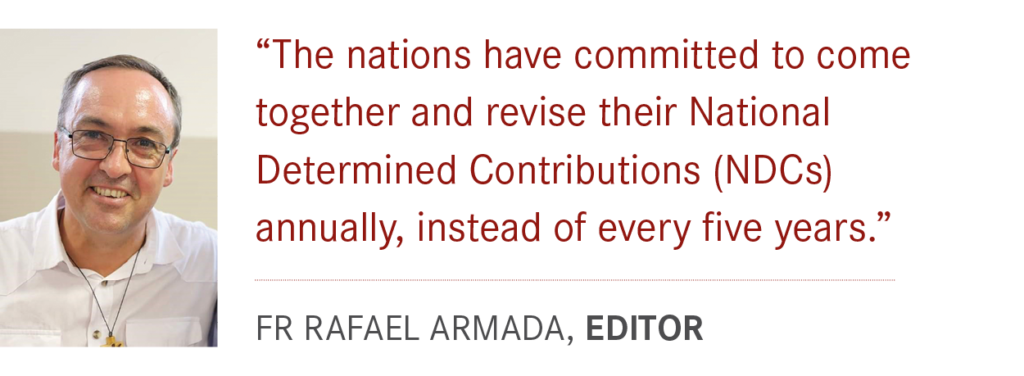EDITORIAL

Hope In A Collective Action
BY Rafael Armada | EDITOR
A crucial conference on climate change (Conference of Parties, COP26) has taken place in Glasgow, from 31 October to 12 November. Nearly 200 countries gathered to discuss global warming. It has already been proved and made evident that human behaviour has placed humanity on the verge of a climate catastrophe.
An urgent call to drastically reduce the warming rate, aiming to maintain global temperatures below 1.5ºC, compared to pre-industrial times, has been restated at this conference if we want to avert a disastrous situation for human lives and biodiversity on the planet.
Global warming is already felt in many parts of the world, creating havoc through many different climatic effects such as floods, drought, raising of sea levels and hurricanes, that particularly affect the most vulnerable on earth. A loss of biodiversity is also taking place at an alarming accelerated speed all over the world. If trends do not change, more and more people will sink into acute poverty and more flora and fauna will disappear forever.
“We have received an Eden, we cannot transform it into a desert for future generations”, said the Pope during the ‘Faith and Science’ gathering at the Vatican on 4 October. It is our responsibility to care for the planet and creation as an amazing gift given to us by God. As Pope Francis has reiterated, regarding climate change, urgent action needs to be taken.
The richer countries, mostly responsible for the damage caused, need to fulfil their promises on climate change, matching their always auspicious long-term pledges towards net zero-carbon emissions with their rather stingy short-term commitments. So far, there has been a clear discrepancy between the two.
However, the good news is that, at COP26, the nations have committed to come together and revise their National Determined Contributions (NDCs) annually, instead of every five years. That will clearly make visible their concrete steps taken and their accomplishments made against climate change. The developed nations have also re-committed, though with regrettable delay, to fulfil their promises made to developing countries to help them with their transition to green energy, adapting their economies and assisting them in repairing ongoing damages suffered due to climate change. All nations have to increase more generously their commitments for 2030; “even if the world meets its 2030 targets, it is still heading for a catastrophic 2.4ºC of warming this century,” says Climate Action Tracker.
The populations in the Global South, the least of the polluters, suffer the worst consequences of climate change, mainly caused by the developed regions of the world. The case of the East African Crude Oil Pipeline (EACOP) project in Uganda, portrayed on the pages of this issue, if not averted, can be one of them.
A just transition, with an adaptation that looks to alternative renewable sources of energy—taking into consideration maintaining jobs for those now employed in the polluting sectors of the economy—is more than urgent.
When you read these lines, it will probably be the time of Advent. This is a season of hope. Its readings invite us to expect with confidence and joy the coming of the Lord, not waiting idly, but actively and in a constructive way. In the fight against climate change, we need a similar attitude, to live in hope that we can reverse the climate catastrophe that will affect millions of people on earth, especially the poor. The commitment needs to be decisive due to the urgency. The active presence of youth activists from the Global North and South in COP26, united and convinced of the importance of their collective actions, is a clear sign of a new mentality rising in humanity and a sign of hope for the world.
